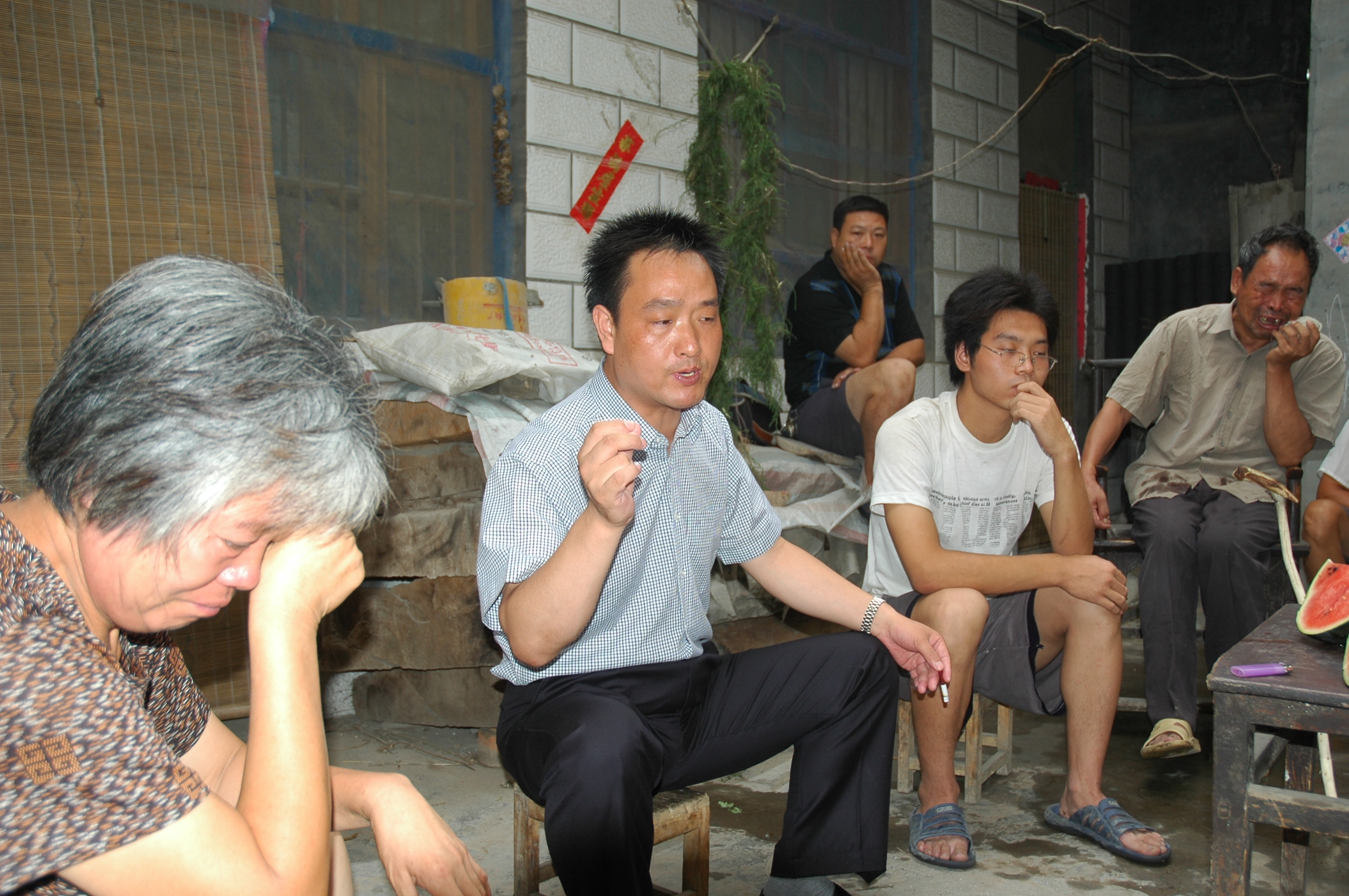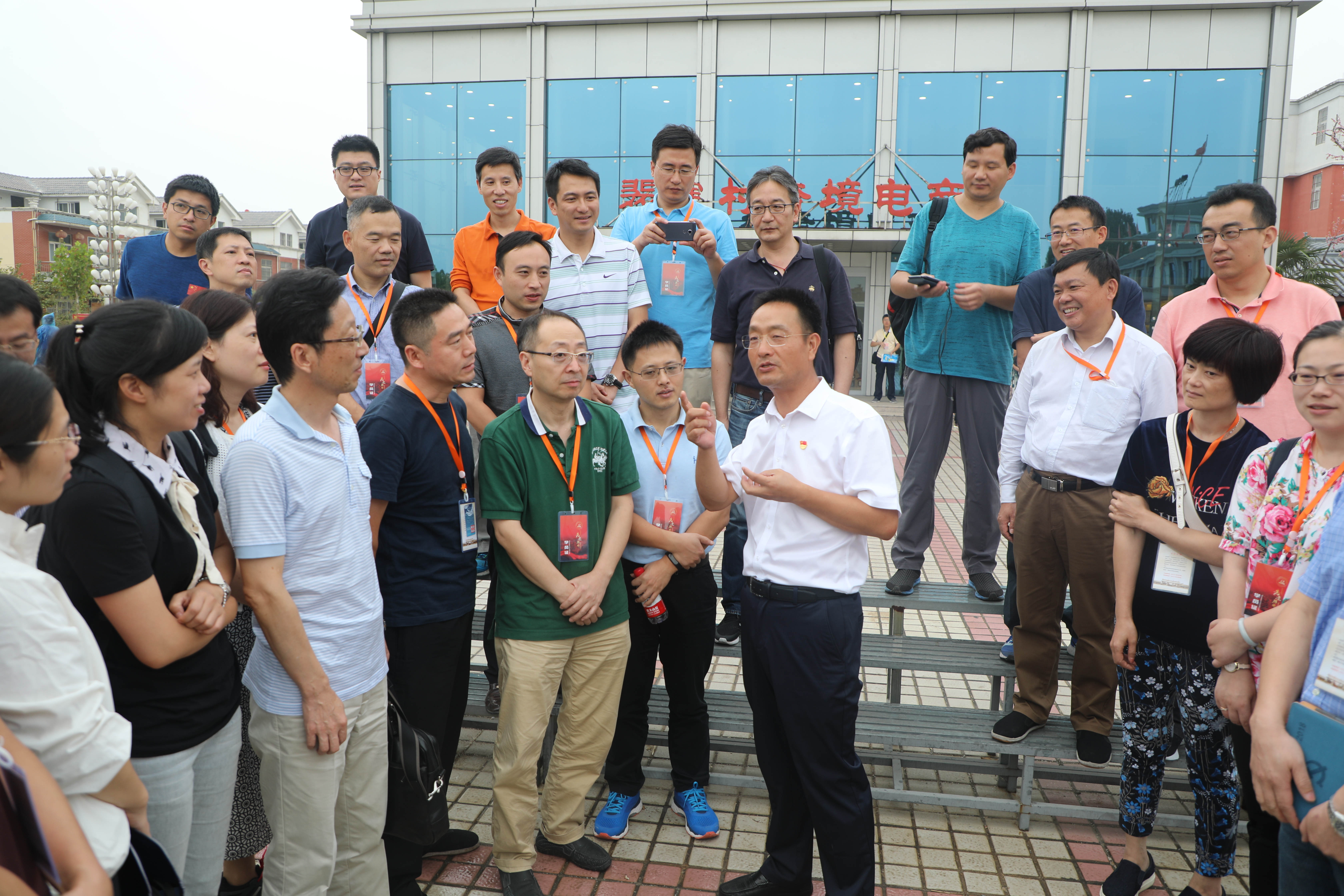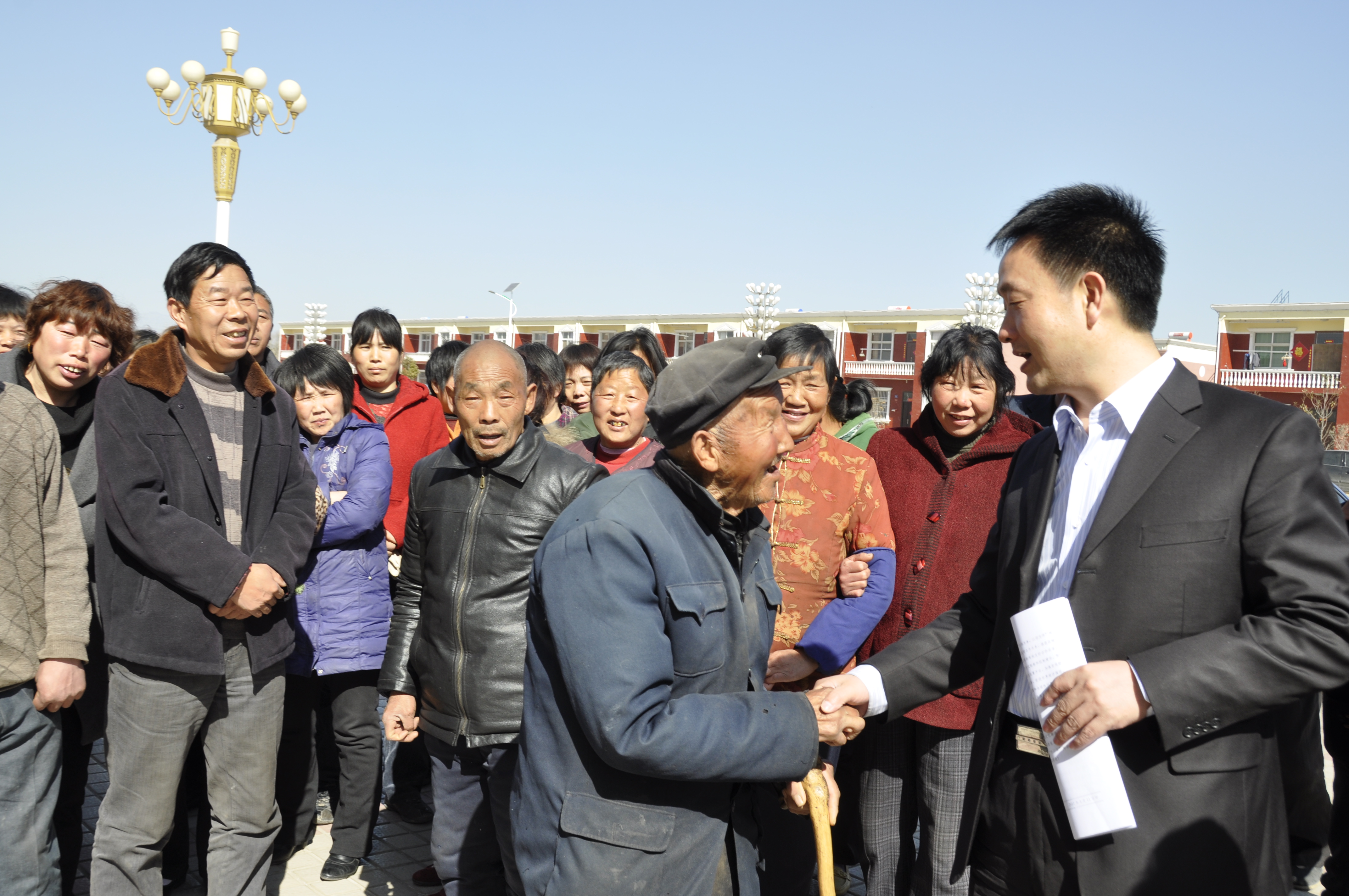Party Chief Builds Model Village for Poverty Alleviation
Pei Chunliang visits a family in poverty on July 19, 2006. [Photo provided to chinadaily.com.cn]
Pei Mingjun, a farmer in Peizhai village, Henan province, is always quick to show off his two "red books" -- his real estate certificate and shares paper.
Polio in his childhood left the young man with a pronounced limp. He married, and their son was born. The couple, however, was so poor to feed and provide clothes for the baby.
People in the village helped them with cloth, shoes and milk powder.
Pei Mingjun came to Pei Chunliang, secretary of the Communist Party of China committee of Peizhai village, asking to buy shares of his company with 20 yuan ($3).
There were eight poor families like Pei Mingjun's. Pei Chunliang, also an entrepreneur running a 3,000-strong corporate group for building materials, chemicals, finance, tourism, hydropower and e-commerce, gave each of the eight families shares worth 20,000 yuan, from which they receive dividends of more than 2,000 yuan every year.
"I hope no one is left behind when the village works hard for a decent life," Pei Chunliang said.
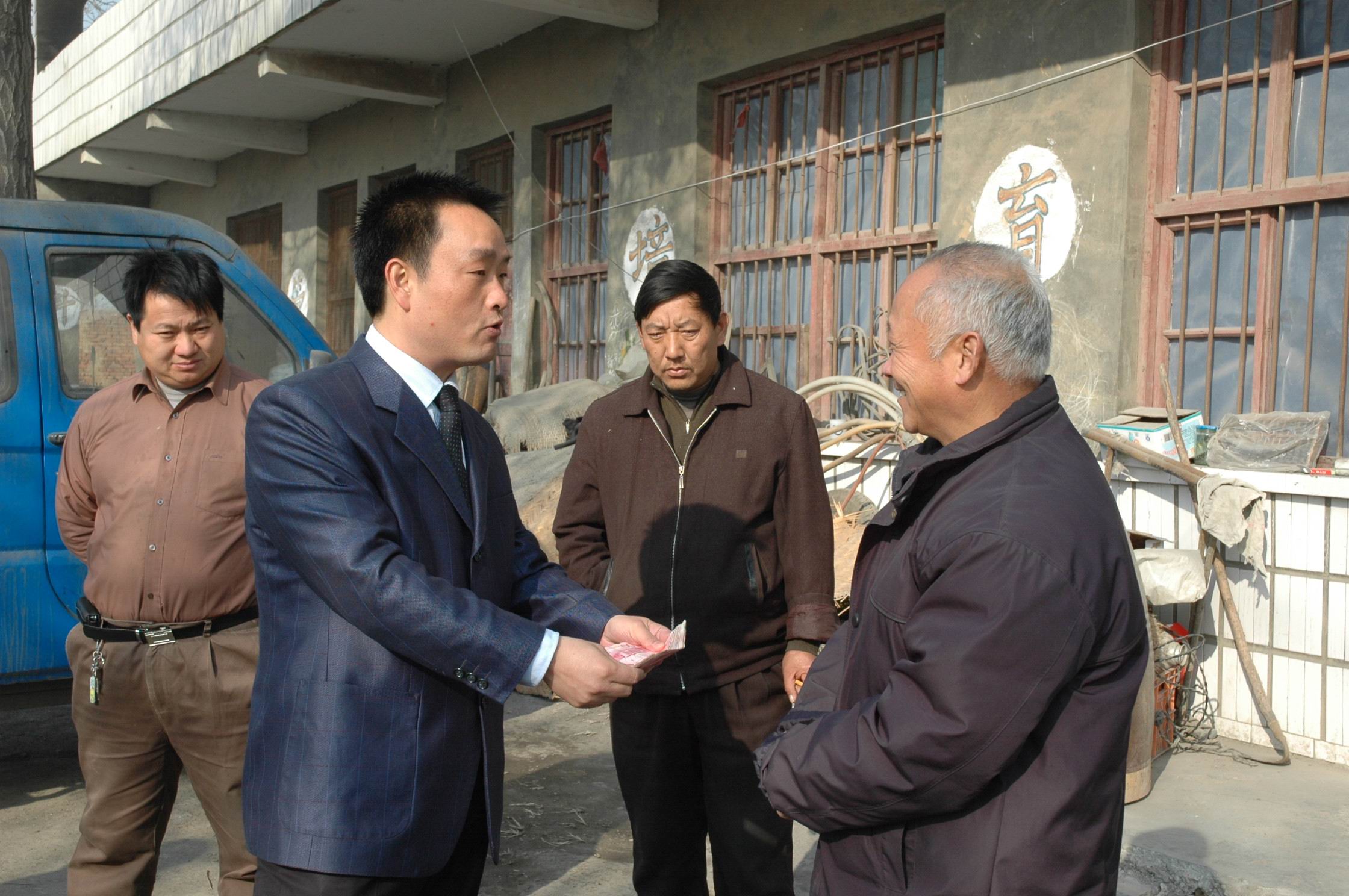
Pei Chunliang visits Pei Xun, a teacher, on Dec 22, 2006. [Photo provided to chinadaily.com.cn]
Pei Chunliang's family was also very poor when he was a child. His father was a stockman for the village, and his mother was illiterate but had a strong work ethic.
"Hunger is my only memory of childhood, when I had never had a hearty meal or new clothes," Pei Chunliang, born in 1970, said. Alluding to further heartbreak, he added, "When it rains, it pours."
When he was a third grader, his eldest brother had a stroke, and his other two older brothers died in a car crash and a coal mining accident respectively. And he lost two of his three sisters-in-law – one remarried and the other ran away, abandoning their young children.
Pei Chunliang dropped out when he should have been in eighth grade. He was moved by his relatives and the neighbors, whom he turned to for money to pay his father's hospital bills. When he was 16, his father passed away, and his family could not afford a funeral. His father was buried with the help of the fellow villagers.
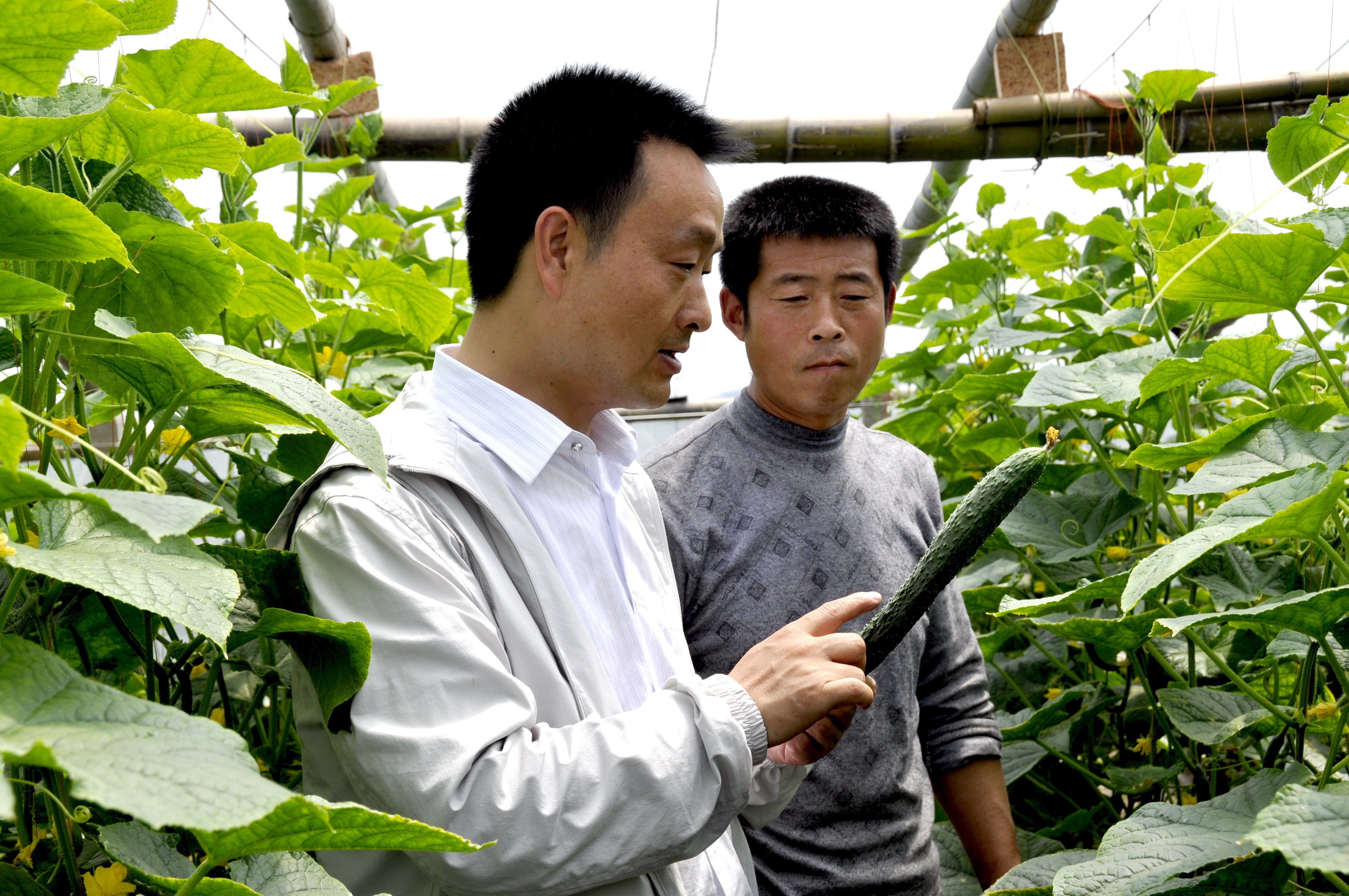
Pei Chunliang learns of agricultural production on May 11, 2011. [Photo provided to chinadaily.com.cn]
Misfortune continued to hit Pei Chunliang's family, with his mother being diagnosed with esophageal cancer. Pei Chunliang had to take care of his three young nephews and nieces, getting food and clothes from people in the village. After quitting school, Pei Chunliang started to make a living by working at a bricks and tiles plant for a monthly wage of 40 yuan.
In 1987 he found the barber shop in the village had a good business. Learning haircutting skills, Pei opened a shop of his own. He hired two apprentices because he had too many customers. At that time people in the country enjoyed frequent perms.
Pei Chunliang wanted to keep himself as busy as possible. He bought a camera and opened a studio, the first one in the village. He also invested in a noodle shop, where his nephews and nieces worked part-time after school.
After several years, his barber shop expanded, and his noodle shop grew into a hotel. And he also opened a shop selling hardware and electrical materials.
The 1992 inspection tour of Wuchang, Shenzhen, Zhuhai and Shanghai by then-paramount leader Deng Xiaoping, the chief architect of China's reform and opening-up policies, heralded a sudden surge of the self-employed and people who went into business.
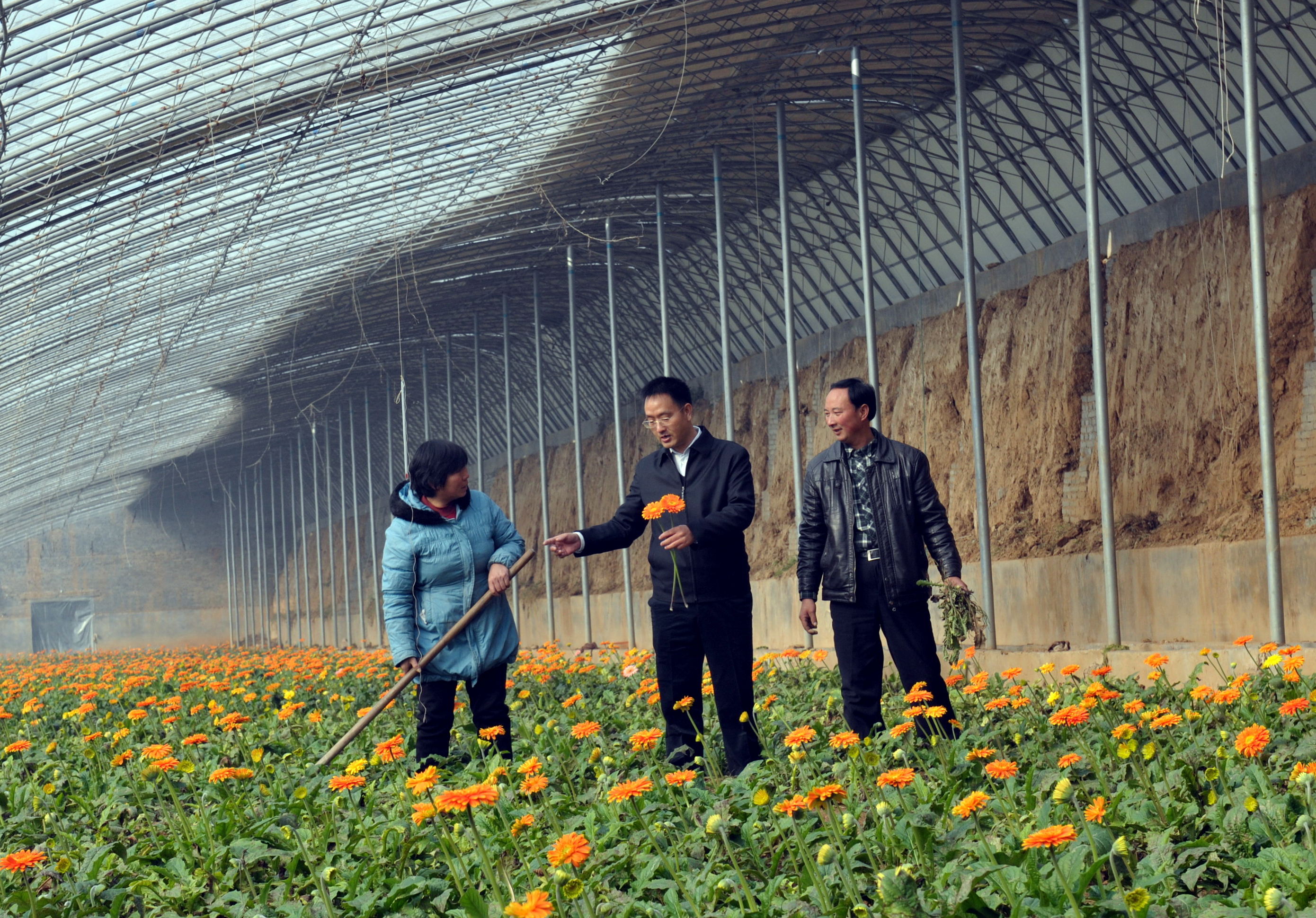
Pei Chunliang helps a flower grower in 2013. [Photo/chinadaily.com.cn]
Pei Chunliang left his family business to his wife and went to Beijing to sell marble produced in Huixian city of Henan.
In 1999, he had bigger ambitions. Selling and transferring all his businesses in Peizhai village to other people, he invested in mechanical casting, mining and hospitality. He became one of the wealthy entrepreneurs in Huixian and was elected representative of the Xinxiang city's people's congress, the local legislature. After that, he was member of Huixian's people's political consultative conference.
Pei Chunliang recently ran into Li Jiazhi, a farmer from Peizhai village, at a hospital in Huixian. Li said she walked 15 kilometers pulling a wooden cart with her ill husband. She told Pei Chunliang she and her husband could not afford bus tickets, as they had only 50 yuan, which was not enough for his medical bills.
Pei Chunliang felt sad about the scanty livelihood Li and other villagers were facing. "I was not happy, even though I was comfortable, seeing other villagers as poor as church mice," Pei Chunliang said.
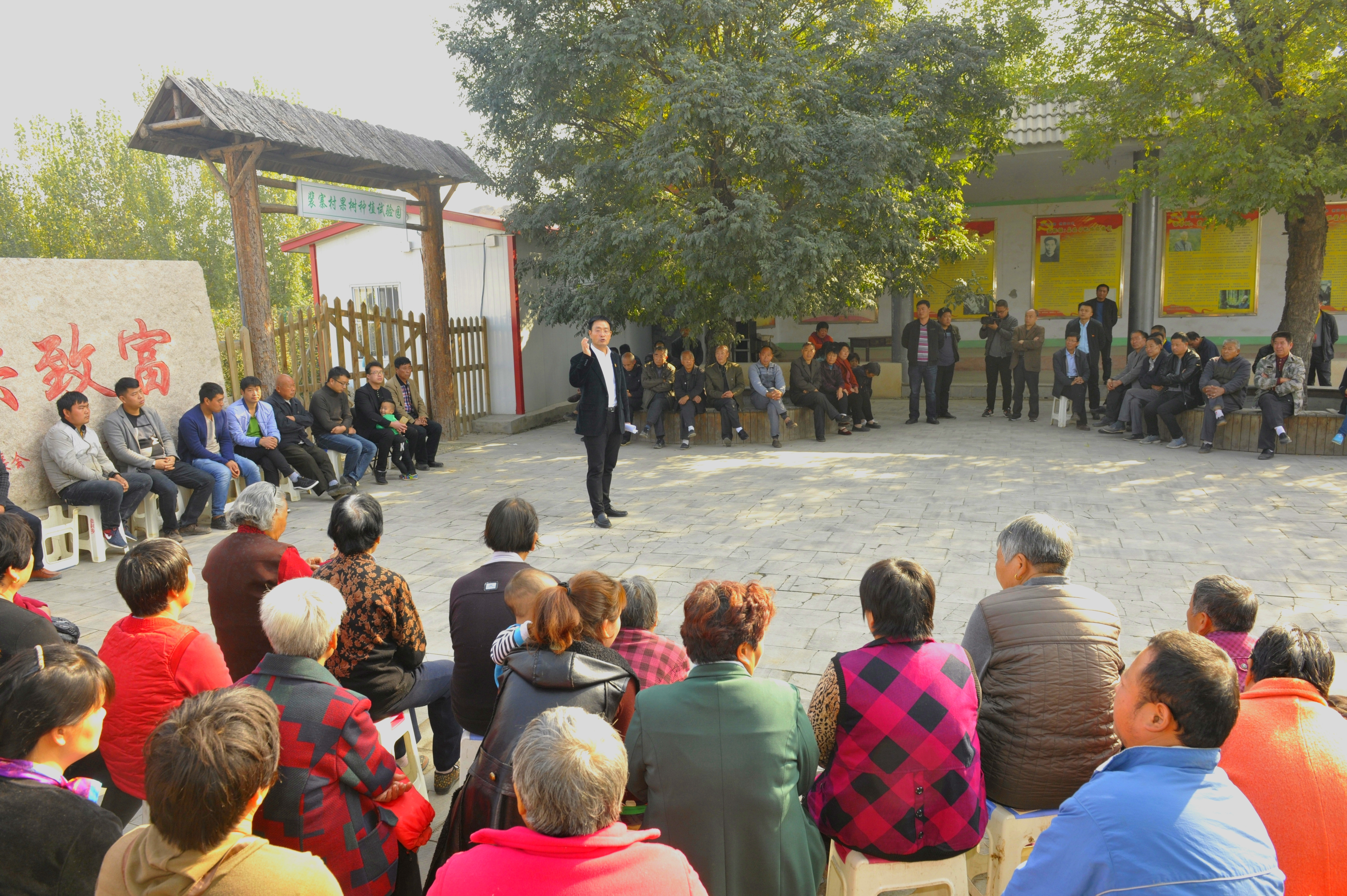
Pei Chunliang tells villagers the spirits of the 19th CPC National Congress on Oct 27, 2017. [Photo provided to chinadaily.com.cn]
He decided to run for head of the Peizhai village neighborhood committee, pledging to improve their livelihood. In April 2005, he won by a landslide.
Reaching a consensus, the villagers started to flatten the barren hill in the south of their village. In three and a half years they leveled more than 6.7 hectares of land and built new houses for all. A draw was used to distribute the houses. In the winter of 2008, all 153 households moved to their two-story houses.
Water supply was the next issue Pei Chunliang dealt with. With only one well, Peizhai village was one of the two most impoverished places in Huixian. Local residents drank rainwater and the water they stored in cisterns.
In eight years, the water shortage, which was a serious issue for generations in the village, was solved, as deep wells were dug, water-lifting projects were done and a reservoir was built.
Pei Chunliang donated 51 million yuan to the fund of more than 60 million for building the reservoir.
Pei Chunliang talks with visitors at Peizhai village on Sept 13, 2018. [Photo provided to chinadaily.com.cn]
With the reservoir ready, Peizhai villagers tore down their previous dilapidated houses to reclaim more than 40 hectares of farmland, on which they built greenhouses for green vegetables, flowers and aquaculture. A vegetable and flower cooperative was formed, with every household a shareholder. It sells high value-added vegetables, such as edible mushrooms, directly to markets.
In 2009, Pei Chunliang joined the CPC.
Responding to the Chinese government's new urbanization plan, which represents a move from land-centered urbanization to people-oriented urbanization, Pei Chunliang helped build a large rural community, including 11 villages, for more than 11,800 residents. Peizhai village served as its center.
He was then appointed secretary of the community's Party committee.
Peizhai village saw more earth-shaking changes, with new facilities such as a primary school, kindergarten, health center, sewage treatment facility, heating system and natural gas supply. "Now we have everything cities have. Bank, supermarket, hotel, you name it," Pei Chunliang said.
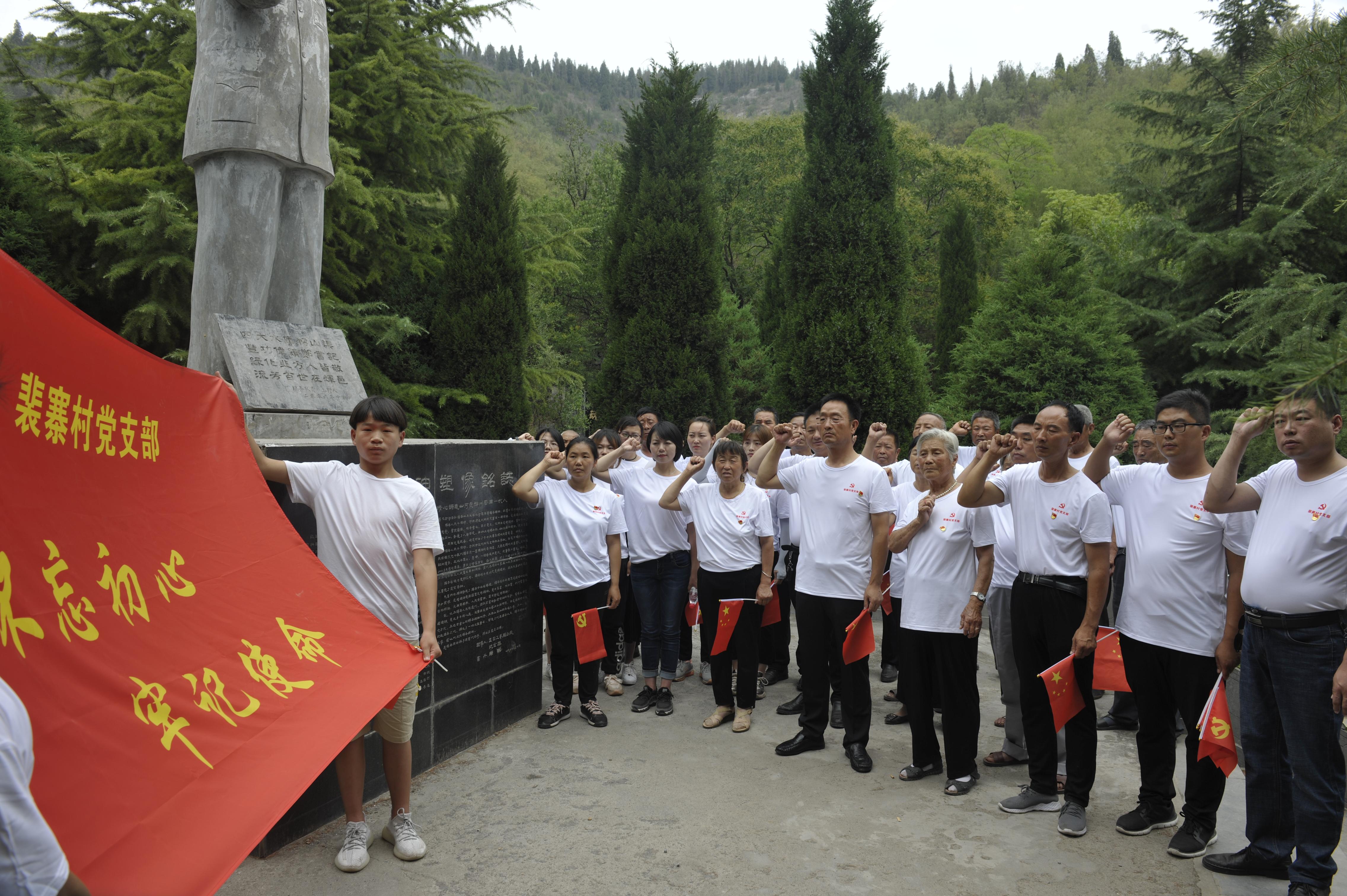
Pei Chunliang and other Party members review the oath of joining the party on June 27, 2019. [Photo provided to chinadaily.com.cn]
To provide people in the large community job opportunities, Pei Chunliang helped build a clothing industrial park, inviting garment companies from Henan and Jiangsu provinces and Shanghai to move in. More than 2,000 local farmers work there.
"We call the park the 'let love come home project'," Pei Chunliang said. "Young couples in rural areas usually leave their kids and parents behind for work in cities. When they return to their hometowns once a year for Spring Festival, their kids are too shy to call them mom and dad."
"It is a heart-wrenching picture. We shouldn't make money at the expense of old generations and young children," Pei Chunliang added.
The industrial park has a home for children, where teachers were recruited to help the employees' young children with their homework during holidays. A piecework system was introduced so employees can take care of their kids and parents.
Pei Chunliang (right) shakes hands with a villager in Henan province in 2011. Pei was honored in October as a role model in China's anti-poverty campaign. CHINA DAILY
Everyone in this big, new community has a job, and every household is a shareholder. The per-capita annual income increased from less than 1,000 yuan before 2005 to nearly 20,000 yuan now. Pei Chunliang has donated 210 million yuan to all the undertakings that have lifted the community out of poverty.
The family of Pei Longyin, a strong villager, became poor because the man suffered a stroke and had to pay large medical bills.
Pei Longyin's story reminded Pei Chunliang as long as all the villagers are healthy, it is possible for the village to be moderately prosperous as a whole.
As a result, Pei Chunliang had signs posted everywhere in the village, reminding the residents to live a healthy life and have a healthy diet, and get regular sleep.
In 2014 the Chinese government implemented a strategy of targeted poverty alleviation, which allowed the central government and local officials to address the needs of individuals and households rather than entire villages. According to President Xi Jinping, targeted poverty alleviation campaign followed an approach based on policies in the areas of industrial development, social security, education, eco-compensation and relocation.
The targeted poverty alleviation program employed the pairing-up strategy that enables impoverished families in western regions to receive support from more affluent eastern provinces.
The campaign also implemented nationwide initiatives to facilitate industrial development. In 2019, China spent $19 billion on a variety of infrastructure initiatives. Through these initiatives, China has been able to build or renovate more than 124,000 miles of road and provide 94 percent of rural villages with internet access.
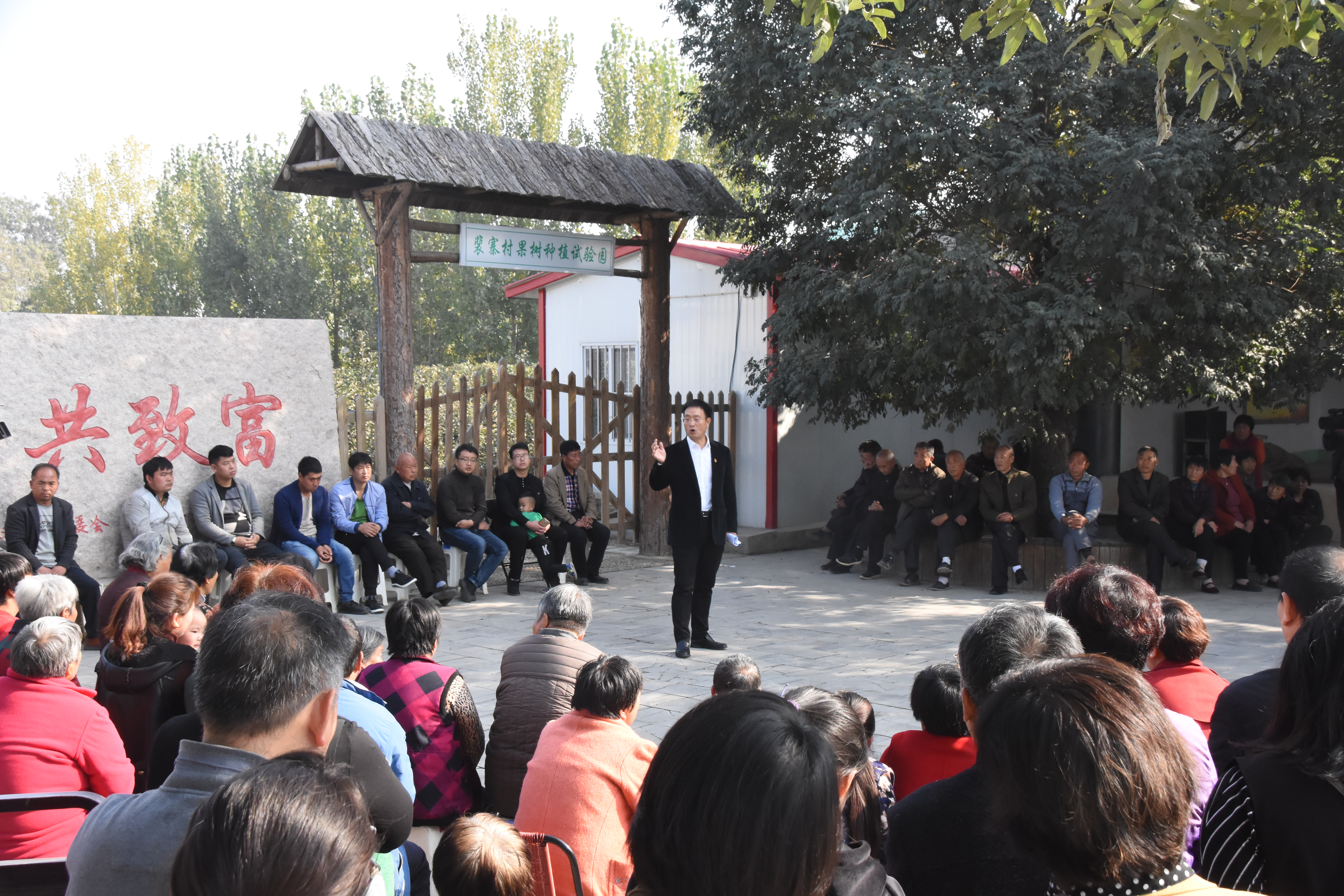
Pei Chunliang tells villagers the spirits of the 19th CPC National Congress on Oct 27, 2017. [Photo provided to chinadaily.com.cn]
China also uses a resettlement program to help lift rural residents out of poverty.
To better understand life deep in the Taihang Mountains, which run down the eastern edge of the Loess Plateau in Shanxi, Henan and Hebei provinces, Pei Chunliang traveled there.
He found out four villages of 453 households with a population of 1,798 still lived in the mountains at an elevation of more than 900 meters. It was impossible for them to get out of poverty on their own.
Pei Chunliang donated 80 million yuan to the local government-supported relocation project and raised more than 500 million yuan to build a tourist resort in Xinxiang city, Henan province. Some of the resettled villagers worked at the resort. Some 2,000 people living on the outskirts of the resort started their own businesses such as bed and breakfasts, restaurants and souvenir shops.
At a meeting to mark China's poverty alleviation accomplishments and honor the role models held in Beijing on Oct 17, 2020, Pei Chunliang was an award recipient.

